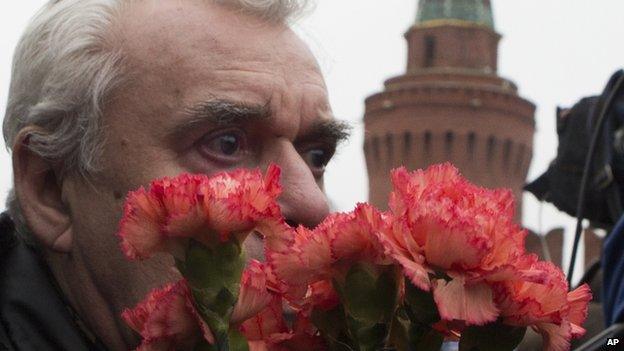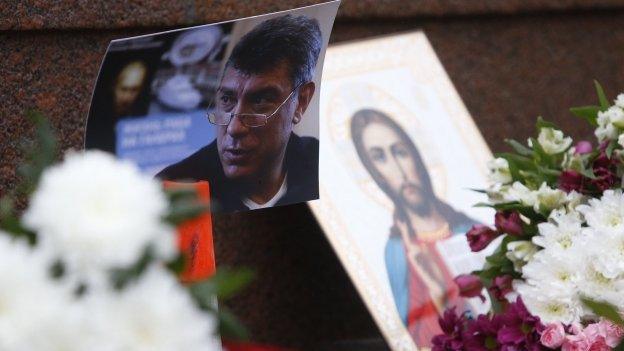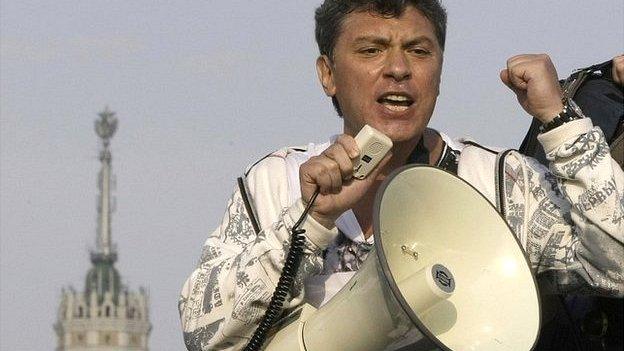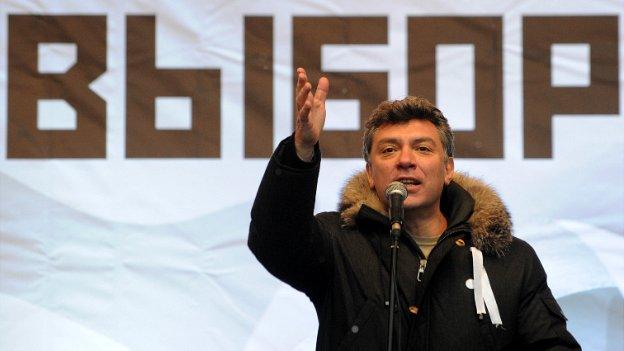Nemtsov murder: Russian society polarised as theories abound
- Published

Supporters of Boris Nemtsov have been paying their respects at the scene of his murder
Russia woke up in shock on Saturday. The press, the social media, the politicians - all describe the killing of Boris Nemtsov, one of the leaders of the country's opposition, as something that was - until Friday night - completely unthinkable.
He was gunned down a stone's throw away from the Kremlin, in an area which is always tightly policed, and where security cameras are everywhere you look. He was, it appears, tracked for hours as he travelled around central Moscow.
Russian President Vladimir Putin called the killing a "provocation" and ordered Russian police chiefs to personally oversee the investigation.
And they were quick to come up with suitable theories.
The head of the Russian Investigative Committee, Vladimir Markin, said that he believes the murder could have been "a provocation aimed at destabilising the country".

One theory suggests Mr Nemtsov was targeted for his opposition to the Ukraine conflict
In a statement, he explained: "Mr Nemtsov may have been sacrificed by those who do not shun anything to reach their political gains." The investigative committee is also looking at a possible "Islamic extremism" connection, and at Mr Nemtsov's links in Ukraine.
Less high-profile police officers have been at work all night. They checked a number of white Ford saloons - Mr Nemtsov's killers reportedly drove one of those ubiquitous cars. And they trawled through Mr Nemtsov's flat in central Moscow, seizing documents and computer drives.
This work will probably take a very long time. From experience, few in Moscow believe that it will name those who ordered the killing. Russian police have a long history of catching people who pull triggers - but they are much less successful when it comes to identifying their masterminds.
In 2006, Anna Politkovskaya, a prominent investigative journalist, was killed in central Moscow. Shooters have been found and jailed; but who ordered the assassination remains a mystery.
So investigations of such high-profile cases have little credibility. Cynical and accustomed to the rule of corruption, many in Russia believe that police can be easily bought off by the rich and the powerful.
People who do end up in the dock are often seen by the public as small fry, too poor to buy freedom from prosecution.
Well-known Russian journalist Aider Muzhdabaev wrote on Facebook: "Footage from CCTV cameras which tracked Boris's killers could be put together into a feature-length film. But I'm certain that characters of this film will never be identified, found, or sentenced."
Ukraine links
The assassination of Mr Nemtsov is already polarising society. Opposition supporters blame the Kremlin. And pro-Kremlin experts and pro-government media are, mostly, in agreement with President Putin.
Sergei Markov, a high-profile pro-government political expert, wrote on Facebook: "One needs to say, honestly, that Boris Nemtsov was killed by people who want to see 'a revolution' in Russia and who organised the Maydan 'protests' in Kiev".
Critics of the Kremlin are expected to gather for a remembrance ceremony on Sunday. Very few of them blame the Kremlin directly.
Their consensus seems to be that it's too early to draw conclusions. But many think that the killing was - indirectly - linked to events in eastern Ukraine.
One theory is that Russian nationalists who fight there are becoming more and more powerful. As they return from Ukraine, battle-hardened and spurred on by propaganda in the state media, they seek to punish people whom they see as enemies of the new Russia.
Mr Nemtsov's political stance - liberal and pro-Western - did not fit into their view of the world.
It will be months before it becomes clear who was behind the murder. It may take years for their motives to emerge. But this killing is likely to become a turning point for Russia. Being a politician there is again mortally dangerous - like it was in the chaotic years which followed the collapse of the Soviet Union.

Violent deaths of Putin opponents
April 2003 - Liberal politician Sergey Yushenkov, external assassinated near his Moscow home
July 2003 - Investigative journalist Yuri Shchekochikhin, external died after 16-day mysterious illness
July 2004 - Forbes magazine Russian editor Paul Klebnikov, external shot from moving car on Moscow street, died later in hospital
October 2006 - Investigative journalist Anna Politkovskaya, external shot dead outside her Moscow apartment
November 2006 - Former Russian spy Alexander Litvinenko, external died nearly three weeks after drinking tea laced with polonium in London hotel
March 2013 -Boris Berezovsky, former Kremlin power broker turned Putin critic, found dead in his UK home

- Published28 February 2015

- Published25 March 2024

- Published28 February 2015
